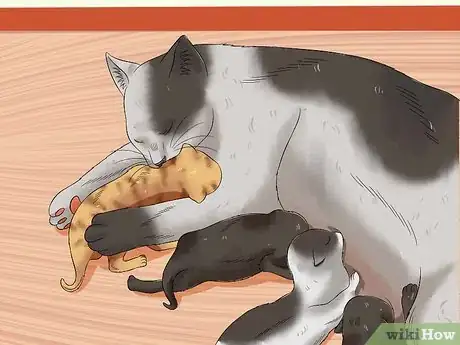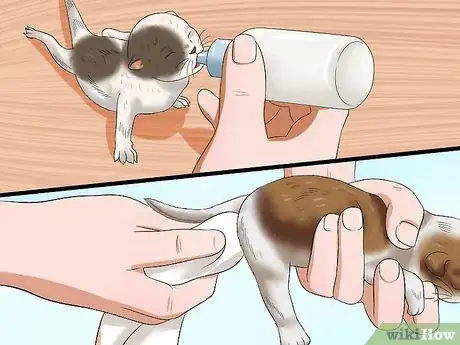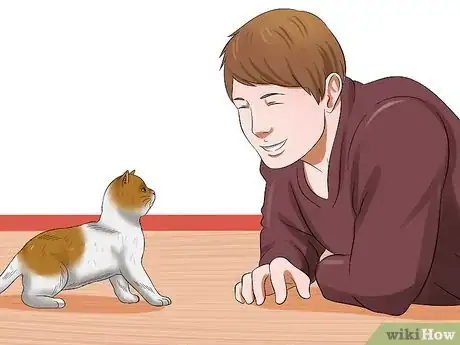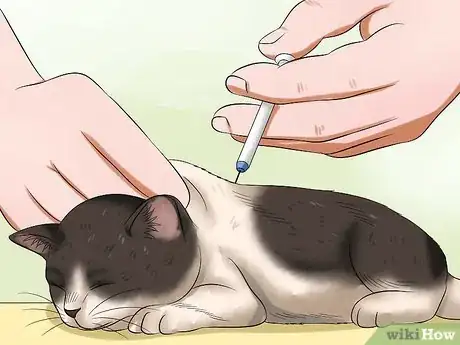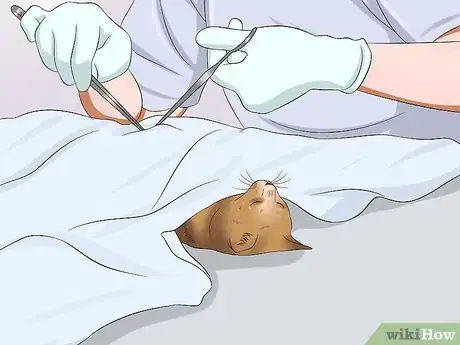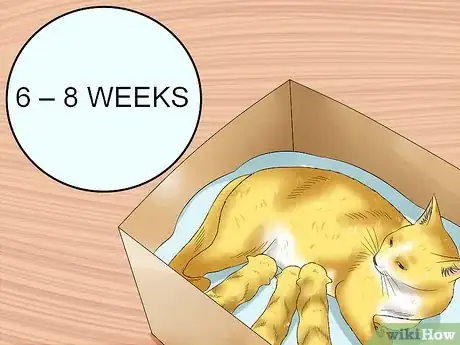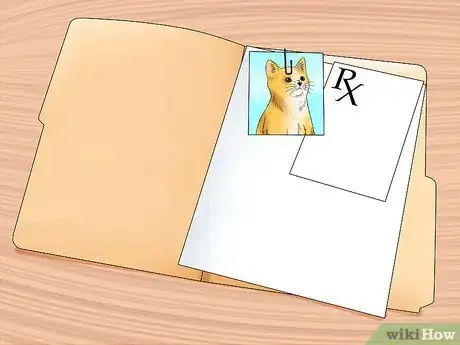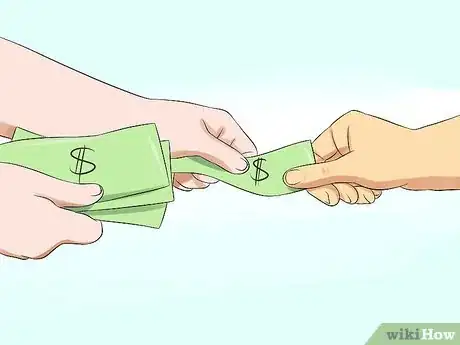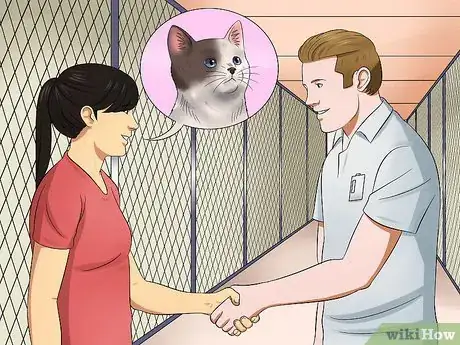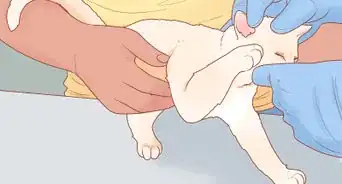This article was co-authored by Pippa Elliott, MRCVS and by wikiHow staff writer, Jessica Gibson. Dr. Elliott, BVMS, MRCVS is a veterinarian with over 30 years of experience in veterinary surgery and companion animal practice. She graduated from the University of Glasgow in 1987 with a degree in veterinary medicine and surgery. She has worked at the same animal clinic in her hometown for over 20 years.
There are 12 references cited in this article, which can be found at the bottom of the page.
wikiHow marks an article as reader-approved once it receives enough positive feedback. In this case, 89% of readers who voted found the article helpful, earning it our reader-approved status.
This article has been viewed 196,172 times.
Newborn kittens are adorable, but also a lot of work. You'll need to decide what to do with the kittens, whether your cat has given birth or you've found abandoned kittens. Giving kittens away is not as simple as dropping them off somewhere. You must care for the newborn kittens until they're old enough to go to a new home. It's also your responsibility to ensure that they're going to a stable home where they'll get care and attention.
Steps
Caring For the Kittens
-
1Keep the newborn kittens with the mother. If your cat has just given birth, she'll take care of the kittens. Provide plenty of food and a safe place so that she can look after her kittens. The mother will also teach the kittens to toilet and socialize. Since they won't be eating solid foods, she'll nurse them in the early weeks. In rare cases, the mother cat can't or won't care for her kittens (because of mastitis, a retained placenta, feeling overwhelmed, or she simply neglects them).[1] Get the mother medical attention to treat physical problems and care for the kittens if she's not looking after them.
- While you won't need to feed the newborn kittens, you should keep their space clean. Frequently check the kittens space to see if you need to change any bedding. They can begin using the litter box around 4 weeks old.[2]
-
2Care for abandoned newborn kittens. If you're caring for newborn kittens that have no mother cat around, first make sure that she is truly gone. Before picking up the kittens, keep a large distance and wait several hours for the mother to come back. If she doesn't or the kittens are in danger, carefully wrap them in towels and place them in carriers with good air circulation. Once the kittens are warm, bottle feed them kitten milk replacement formula every 3 hours.[3]
- You should also do this for any kittens that a mother cat is neglecting, even if she's still around.
- You'll also need to help the kittens use the toilet. Use a damp washcloth or piece of gauze and wipe it across their genitals until clean. Dry off the kittens.
Advertisement -
3Socialize the kittens. A caring mother cat reduces kitten's stress. If the mother isn't around or is neglecting them, you'll need to nurture the newborns. This is critical during the first few weeks of life, so if you can, try to give the kittens to someone who has a cat that is currently nursing. If you must socialize the kittens, start slowly and earn their trust. Gradually begin holding the kittens, introduce them to other people, and play with them as they get older.
- If you're worried about starting out, let the kittens become familiar with you while you feed them. This way, they'll associate the feelings of comfort and trust with you.[4]
-
4Get the kittens vaccinated. The kittens will get antibodies from their mother's milk, but they will need vaccines after a few weeks. It's a good idea to vaccinate kittens before you give them away. Not only will it improve your chances of finding a home for them, but you'll also ensure they're getting important medical care. Follow this early schedule for newborn kittens:[5]
- 8 weeks old: FVRCP Vaccine (Feline Viral Rhinotracheitis Calicivirus and Panleukopenia), start heartworm, flea, and tick preventatives
- 12 weeks old: FVRCP booster, feline leukemia virus (FELV) vaccine
- 16 weeks old: FVRCP booster, FELV booster, rabies vaccine
- Remember that vaccine protocols may vary depending on the vaccine brand you use.
-
5Spay or neuter the kittens. You should go ahead and spay or neuter the kittens before you re-home them. This ensures it gets done and may increase the chances that someone wants to adopt them. If you're giving the kittens to friends or family, you could discuss this with them to see if they'd like to cover the cost.
-
6Wait until the kittens are 8 weeks old before giving them away. The kittens will benefit from staying with their mother for as long as possible. Their mother will nurse them, teach them to eliminate, and help them learn valuable socializing skills.
- Laws about how early you can sell kittens vary, so check your state's laws.[8] In general, try to wait until the kittens are weaned, about 8 weeks.
- Even if you're hand-raising the kittens (no mother is around), you should still wait 8 weeks before giving them away. This way, you ensure they're getting proper medical treatment and socialization.
Finding a Good Home
-
1Gather information about the kittens. Potential adopters will want to the kittens' history. If you have several kittens, you may want to give a photograph of each of them along with a short personality description. Keep track of important information in a file that you can give the adopter. Include this information:
- Birth date
- Medical history, including vaccinations and preventatives
- Surgeries, including spaying or neutering
- List skills, including whether the kittens are housetrained
-
2Find someone to adopt the kittens. Ask your friends and family if they're interested in adopting the kittens. It may be easier to place the kittens if you find people you already trust. If no one's showing interest, begin asking coworkers or neighbors. You can also ask the veterinarian to recommend people who are looking to adopt kittens.
- Try to ask around in person before advertising. While social media makes it easy to advertise kittens, it may be harder to find a reliable, trustworthy person to take them.
-
3Interview the potential adopter. If someone who's not a friend or family wants to adopt your kittens, interview the person. Ask to meet in a public place and consider asking for references. The goal of the interview is to determine whether the person can be trusted with the kittens, whether the person can provide for them, and if the person will keep them for the long term. Consider asking these questions:[9]
- How much are you willing to spend on your pets?
- Do you have a veterinarian?
- Do you have any other pets? If so, how long have you had them?
- Do you have children?
- If you rent, are you allowed to have pets?
- When they're older, will the cats have access to the outdoors? If so, do you have a fenced yard?
-
4Charge a small fee. While you may think it would be easier to simply give the kittens away for free, it's better to ask anywhere from $20 to $60 for them. This prevents untrustworthy people from just taking free kittens and abusing them or selling them to labs. The fee can also weed out people who aren't serious about adopting.[10]
- You can either use the fee to pay for early veterinary care (shots, spay, or neuter). Or, you can waive the fee once you've found honest and reliable adopters.
-
5Contact an animal organization. If all else fails and you can't find someone reliable to adopt the kittens, find an organization to take the kittens. A local animal shelter, humane society, or rescue organization may be able to take the kittens. Note that some may charge a small fee or may not be accepting kittens.
- Before you drop the cats off to an animal shelter, research whether it is a no-kill shelter. Some shelters may euthanize animals if they don't have enough space.
Warnings
- Pay attention to early illnesses in newborn kittens. Get medical attention if you notice one kitten lying away from the litter mates, it doesn't nurse, it appears restless, or it cries frequently.[11]⧼thumbs_response⧽
- Newborn kittens need mother's milk or kitten milk replacer (KMR). Only give cow's milk in case of an emergency. Ask your veterinarian how to give newborn kittens a mixture of cow's milk and egg yolk until you can get KMR.[12]⧼thumbs_response⧽
References
- ↑ http://www.petful.com/behaviors/cat-refuses-to-feed-her-kittens/
- ↑ http://www.alleycat.org/neonatal
- ↑ http://www.animalalliancenyc.org/wordpress/2013/05/what-to-do-and-not-do-if-you-find-a-newborn-kitten/
- ↑ http://www.alleycat.org/page.aspx?pid=292#socialization
- ↑ https://www.vetcoclinics.com/resource-center/dog-vaccinations/
- ↑ http://www.spayusa.org/pet-owners-faq.php
- ↑ https://www.aspca.org/pet-care/general-pet-care/low-cost-spayneuter-programs
- ↑ https://www.animallaw.info/site/search-results?googlesearch=sale%20of%20kittens
- ↑ http://www.mnn.com/family/pets/questions/why-do-pet-rescuers-ask-such-nosy-questions-dont-they-want-me-to-adopt-their-d
About This Article
To give newborn kittens away, wait until they're at least 8 weeks old since they'll be better off staying with their mother for as long as possible. In the meantime, make sure you get the kittens vaccinated and spayed or neutered so they're healthy when you give them away. Then, after 8 weeks, try to find friends, family members, coworkers, or neighbors who are interested in adopting a kitten. If you're going to give your kittens away to strangers, make sure you interview them first to make sure they're trustworthy. For more tips from our Veterinary co-author, like how to choose a fee to charge for your kittens, scroll down!
